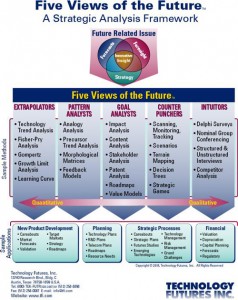Wayne Gretzky said. “I skate to where the puck is going to be, not where it is.” This statement not only applies to hockey, but also to the business world.
Our class just completed a Capstone simulation where we competed as companies selling sensors. It gave us an opportunity to run a corporation by making several business decisions including R&D, HR, Marketing, Operations and Finance. One lesson I learned is how important forecasting is to a company. It helps drive some very important decisions. It impacts on how we calculate our capacity as well as how we want to invest for the year. We are constantly challenged to keep a positive cash flow. This is also very true in the real world. I believe we would have performed better with more accurate forecasting and we did put together a spreadsheet to help us, but it’s more than just data. Professor Byron Anderson from the University of Wisconsin-Stout said it best. “If futuring were only based on science, statisticians would be wealthy.”
In an age where Big Data is becoming increasingly important, people continue to struggle with forecasting. Data as a platform is quickly becoming an industry of its own. Businesses are being formed around meta-data management, enterprise performance management tools, data warehouse utilities and search engines. However, people still struggle to accurately forecast. These tools are great, but they are just tools. There is a human element that also exists. During our competition, some of us knew how other teams would react because we know them well. These decisions can’t be found in a spreadsheet or queried from some place. We are forced to know our customers and our competition at all times. This information is invaluable.
- What’s the size of the market and how fast is it growing?
- What’s the competition doing?
- What types of opportunities are there for the company?
- How much demand will there be?
- How much money will the company need to borrow?
- Etc.
John Vanston did some work around forecasting. He created a model bringing Forecasting, Foresight and Strategy together. This model gives us a view ranging from heavily quantitative to more qualitative approaches. (Byron C. Anderson 2012) This helps students understand what is needed to decipher the data around us and I’ve provided a picture of his framework below.
After my recent experience and reading a little more about forecasting, I wonder if there is a need for a required class within the MBA program. This isn’t a challenge for one particular industry. It can be applied from manufacturing to finance to sports (as evident with the recent movie Moneyball). I believe forecasting is more than just numbers. It’s an art. Who’s making decisions and why are they making these decisions are just as important. In a constant world of pressure for margin, having accurate forecasts could mean the difference between staying in business or not.
What are your thoughts about forecasting as a mandatory course for MBA students?
What experiences (Good / Bad) have you encountered at work with forecasting?
References:
- Irving Wladawsky-Berger, “FiveThirtyEight Prove Predictive Analytics Getting Real” CIO Journal Dec. 16, 2012
- Byron C. Anderson, “Taking Stock in teaching forecasting: bringing business case studies to life helps students explore technology’s impacts” The Futurist Feb 2012
- Michael Ohata & Arun Kumar, “Big Data: a boon to business intelligence” Financial Executive Sept. 2012
- John Vanston’s 5 Views of the Future
